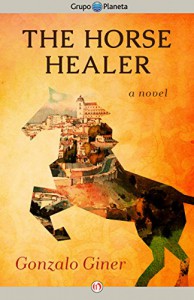Maybe for some people

Disclaimer: ARC via Netgalley.
I wanted to like this I really did.
I should note that I read a translation, so maybe the original is much better in terms of style.
So let’s start with the bad and end with the good because there is some good in this book, and maybe for some people the bad really wouldn’t be bad.
Please note that I read an advanced proof of a translation, so my brief comments on style might not apply to the finished copy.
The Horse Healer in a large part is an adventure story about a young boy’s journey to manhood in trying times after his family has been torn asunder. The boy, Diego, finds himself caught between Muslim and Christian forces. It would make a good mini-series on cable. The style, however, rarely rises above the level of a mediocre novelization of a movie. Now, this could be a translation issue, but there is nothing about the style that brings the reader into the novel, and the reader is always aware that they are reading a novel.
But the style wasn’t the major problem. Mediocre novelizations can be entertaining. The problem is Diego himself. Diego is Mr. Perfect. He is like the Luke Skywalker Marty Sue. All the women, even those old enough to be his mother, want him, everyone loves him (and those who don’t all the “bad” people), he is talented, thoughtful, and years ahead of his time. He impresses everyone, except the reader who just wants to smack him.
Oh, and nothing is ever his fault, not really.
My tolerance for Mary and Marty Sues is at an all time low. Sorry. Diego’s perfection is only challenged by that of his younger sister who is he close to. She is only different from his other two sisters in that her name starts with a different letter and everyone loves her. Outside of that all the sisters are pretty much interchangeable.
And that’s another problem. Most, if not all, of the women in this book are types and not fully developed characters. The only possible fully realized female character is Fatima, but she gets so little stage time, it’s hard to say.
On a more “it’s me not the book level” we have the whole older sibling clichéd endings that I have seen so many times and as an older sibling get really tired of. That is me.
But there are some sparks and light in this book.
The sections with the horses are absolutely brilliant. When Diego refuses to let Sabba, his mare, be stolen from him, it is done in a believable way, and it is a time, a rare time, when Diego comes across as human, as a person as opposed to a Marty Sue. There is something off, I will admit, when you feel more for a death of an animal in a book than one of the human characters who you are supposed to know, but the relationship between the people (both men and women) and their horses is really well done.
The historical aspect is well done too. There is an immense amount of history relied though the writing, and at the very least, the book will make you want to know more about the era. In other words, this isn’t the type of historical novel that simply nods at the history; it uses it. Sometimes the wrong people (but never the really wrong people) die.
I also have to give credit for Giner’s use of both Muslim and Christian characters. While Diego is pro-Spanish, obviously, Giner uses Muslim characters who are sympathetic and not villains. Furthermore, he shows both good and bad from both sides of the conflict; if anything, Giner supports the little guy who is caught up in stupid power struggles. This even handiness in presenting something that is in part a religious war should be lauded.
While I can’t recommend the book, I can say that if your tolerance of the flaws is stronger than mine (and mine is rather low at the moment), you might enjoy this adventure story.
 8
8








